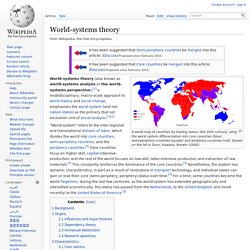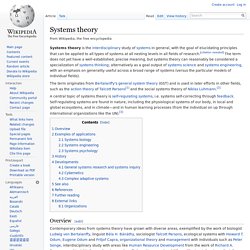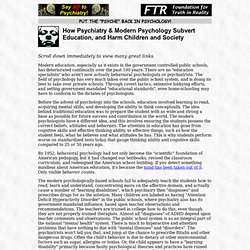

VideoCasting - Systems Methodologies for Solving Real-World Problems: Applications in Public Health. Buy the book: Korotayev A., Malkov A., Khaltourina D. / Introduction to Social Macrodynamics: Compact Macromodels of the World System Growth / Korotayev A., Malkov A., Khaltourina D. / ISBN 5-484-00414-4. Human society is a complex nonequilibrium system that changes and develops constantly.

Complexity, multivariability, and contradictoriness of social evolution lead researchers to a logical conclusion that any simplification, reduction, or neglect of the multiplicity of factors leads inevitably to the multiplication of error and to significant misunderstanding of the processes under study. The view that any simple general laws are not observed at all with respect to social evolution has become totally predominant within the academic community, especially among those who specialize in the Humanities and who confront directly in their research all the manifold unpredictability of social processes. A way to approach human society as an extremely complex system is to recognize differences of abstraction and time scale between different levels. This book discusses general regularities of the World System growth. dN/dt = B -- D, (0.1) dN/dt = B -- D -- div J, (0.1') dN/dt = rN(1 -- N/K), (0.2)
World-systems theory. A world map of countries by trading status, late 20th century, using the world system differentiation into core countries (blue), semi-periphery countries (purple) and periphery countries (red).

Based on the list in Dunn, Kawana, Brewer (2000). World-systems theory (also known as world-systems analysis or the world-systems perspective),[1] a multidisciplinary, macro-scale approach to world history and social change, emphasizes the world-system (and not nation states) as the primary (but not exclusive) unit of social analysis.[1][2] Background[edit] Immanuel Wallerstein has developed the best-known version of world-systems analysis, beginning in the 1970s.[4][5] Wallerstein traces the rise of the capitalist world-economy from the "long" sixteenth century (c. 1450-1640). Many other scholars have contributed significant work in this "knowledge movement".[2] Origins[edit] Influences and major thinkers[edit] World-systems theory was aiming to replace modernization theory.
Dependency theory[edit] General Systems Theory and Systems Analysis. Systems theory. Systems theory is the interdisciplinary study of systems in general, with the goal of elucidating principles that can be applied to all types of systems at all nesting levels in all fields of research.

Eco/ECO_other/Issue_6_1-2_18_CP.pdf?AspxAutoDetectCookieSupport=1. General Systems Theory. © 1993, David S.

Walonick, Ph.D. General systems theory was originally proposed by biologist Ludwig von Bertalanffy in 1928. Since Descartes, the "scientific method" had progressed under two related assumptions. A system could be broken down into its individual components so that each component could be analyzed as an independent entity, and the components could be added in a linear fashion to describe the totality of the system. Are you past oriented or future oriented. TEDxFlanders - Gunter Pauli - System Design. Gunter Pauli - HEC Sustainable Business Conference 2012. Gunter Pauli (1 of 8) The Blue Economy. Fritjof Capra - Bibliography. Home. On April 6, 1994 Gunter Pauli arrived in Tokyo at the invitation of Heitor Gurgulino de Souza, then Rector of the United Nations University who with the support of the Japanese Government decided to create a think tank which was to imagine a competitive business model in a world guided by the Kyoto Protocol.

Twenty years later, the philosophy of zero emissions, where waste is converted to revenues, and unused yet widely available resources are cascading into a chain of value generation, can look back at nearly 200 implemented projects, the generation of €4 billion in investments and an impact as a concept that created to an estimated 3 million jobs. The most widely copied project is the farming of mushrooms on coffee (+1,000), the most advanced is the biorefinery with the inauguration of the first and second phase in Porto Torres, Italy in a few months. Www.zeri.org/ZERI/Articles_files/Conflict Resolution article.pdf. Reforestation. Www.zeri.org/ZERI/Articles_files/Futurebiotechnologie.pdf. Www.zeri.org/ZERI/Articles_files/GMO.pdf. Fritjof Capra, The Systems View of Life.
- PORTO - Publications Open Repository TOrino. DavidSibbet.com. The Grove Consultants with David Sibbet. David Sibbet: 2011 Systems Thinking in Action Preview Video. Modeling the Economic Crisis. I’m often asked by customers that are new to Systems Thinking, “How can this approach add value to conceptualizing and understanding common, everyday issues?” The issues range from business design to environmental concerns to macroeconomic dynamics. In response to this question, I can tell you from my personal experience, nothing beats seeing a skilled practitioner use our software tools and the Systems Thinking methodology to make sense out of a complex problem. With this in mind, we collaborated with our consulting and training partner, Lexidyne LLC , to create a new series of video-based presentations focused on common but often misunderstood problems that can be conceptualized, expanded, and then explored using Systems Thinking.
We recently released the first video in this series — Understanding the Economic Crisis presented by Dr. Mark Paich. Judging from its title, you might think Understanding the Economic Crisis presents a huge complex model of the macro economy. Knowledge Management using NovaMind Mind Mapping Software.
"Systems Thinking, Complexity Theory and Management" by David C. Aron, M.D., M.S. Russell Ackoff - Systems-Based Improvement, Pt 1. Gunter Pauli, The logic of system design. Systems Thinking with Peter Senge of The Fifth Discipline; ExIn041111. Applied Systems Thinking Institute - Video Presentations. Systems Thinking: How to get leverage in a service system. Appraising Education Reform, Part 1: A Failed System.
The end of the decade has inspired me to reflect on contemporary efforts at education reform in the U.S., and to suggest next steps.

This blog entry, in which I review the evidence of failure of our education system and explain the challenge created by rapid globalization, is the first part of what will ultimately be a 3-part series. American K-12 schools, colleges, and universities underwent their formative development in earlier eras. They matured in a time devoid of intense international competition, a time when a nation’s power was principally derived from what it could grow and extract from the ground, a time when human knowledge expanded incrementally, not exponentially, a time when individual creativity was subordinate to collective activity, and a time when most individuals prepared for life-long careers, and felt no need continually to reinvent oneself.
America’s historic education system was ahead of its time and has served the nation well. Graphic #1A Graphic #2A Graphic #2. Modern Education, lack of academics, psychiatry, behavioral psychology, "science" and the ultimate betrayal of the students. Scroll down immediately to view many great links.

Modern education, especially as it exists in the government controlled public schools, has deteriorated continually over the past 100 years. There are no "education specialists" who aren't now actually behavioral psychologists or psychiatrists. The field of psychology has very much taken over the public school system, and is doing its best to take over private schools. Through covert tactics, extensive lobbying efforts, and setting government mandated "educational standards", even home-schooling may have to conform to the dictates of psychologists.
Before the advent of psychology into the schools, education involved learning to read, acquiring mental skills, and developing the ability to think conceptually. The failure of our modern educational systems « Greyed Matter. Mark Twain once said ” I have never let my schooling interfere with my education”.

His words seemed to me to reflect some of the doubts i have been harboring about educational systems that the modern world has built up. From my schooling days, i have noticed people with immense potential being caged up in written dogmas and text books. Their imagination and creativity nipped in the bud. Julie Theriot (Stanford) Part 3: Principles of Cellular Organization.